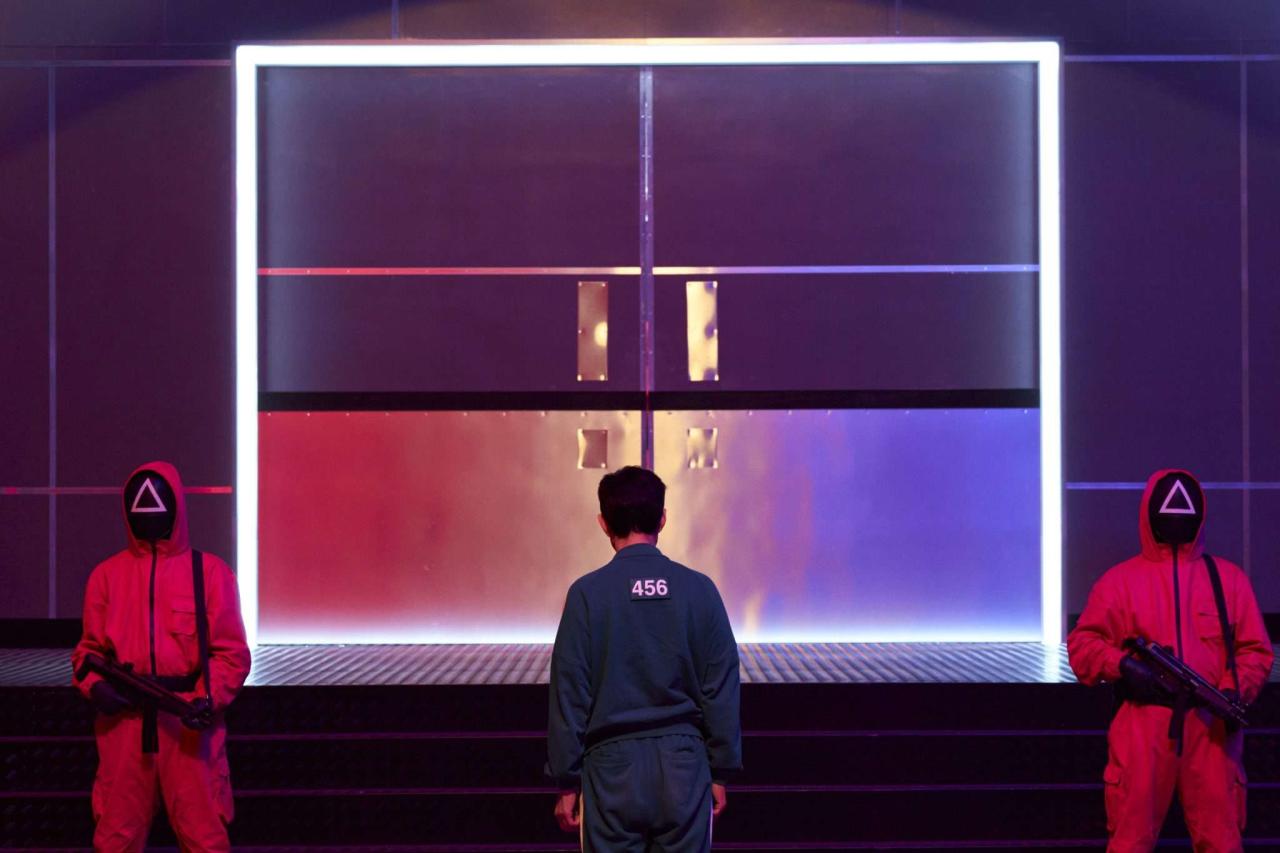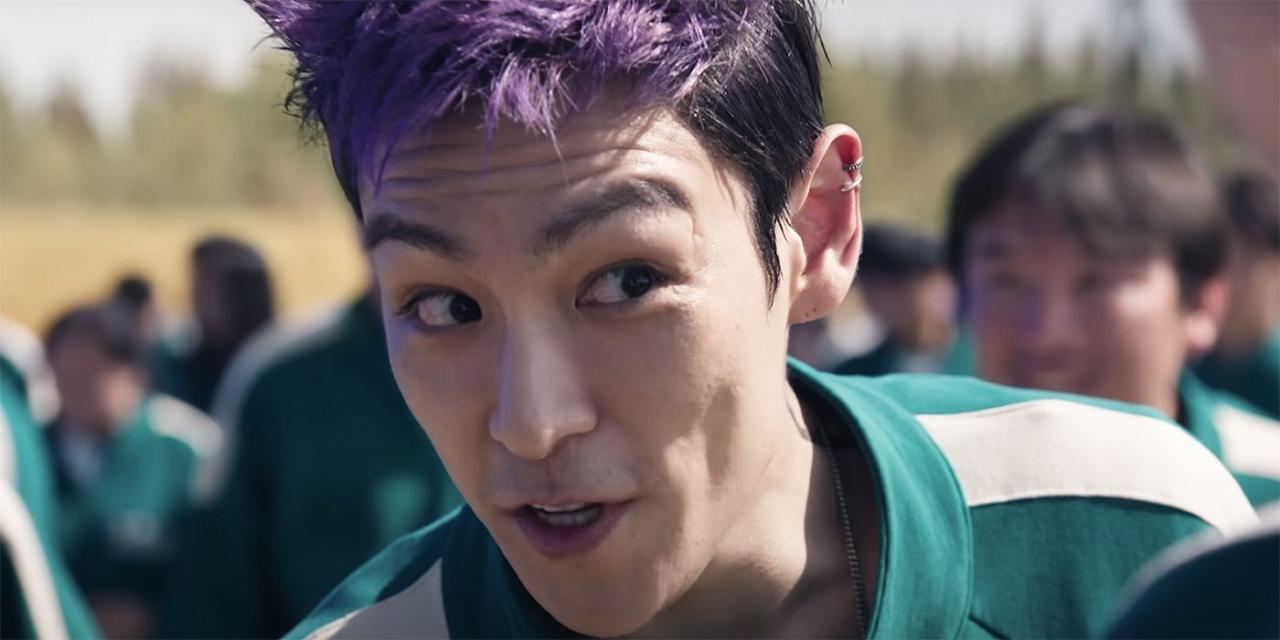Squid Game Histoire Vraie? Is the wildly popular South Korean show a reflection of real-life struggles, or purely fictional entertainment? This exploration dives into the show’s inspiration, examining the socio-economic realities of South Korea that may have fueled its creation. We’ll unpack the games themselves, comparing them to historical children’s games and analyzing their deeper meaning as metaphors for societal pressures.
Get ready to see the show in a whole new light.
We’ll analyze the show’s depiction of violence and social commentary, comparing it to real-world instances of injustice and exploring its global impact and cultural resonance. Finally, we’ll consider the show’s lasting impact and potential future implications on social discourse and storytelling. Let’s unravel the truth behind the games.
The Inspiration Behind “Squid Game”: Real-World Parallels in South Korea
The dystopian world of “Squid Game” isn’t entirely fictional. Its brutal depiction of desperation and competition finds disturbing echoes in the realities of South Korea’s economic landscape and social inequalities. The show draws inspiration from the country’s history of economic hardship and its impact on individuals and families.
South Korea’s Debt Crisis and Social Impact
South Korea’s rapid economic growth has been accompanied by significant income inequality. Many citizens struggle with crippling debt, often due to factors like high living costs, educational expenses, and pressure to maintain social standing. This financial pressure can lead to immense stress and even despair, pushing individuals to desperate measures. The show reflects this reality by showcasing characters driven to participate in the deadly games due to overwhelming debt.
South Korea’s Economic Landscape and Social Inequalities
The stark contrast between the wealthy elite and the struggling masses is a central theme in “Squid Game.” The show depicts a society where opportunities are limited for those in lower socioeconomic brackets, highlighting the systemic issues that contribute to this disparity. This is not a far cry from the real-world situation in South Korea, where a significant gap exists between the wealthiest and poorest segments of the population.
Historical Context of Economic Hardship
South Korea’s economic history includes periods of significant hardship, including the aftermath of the Korean War and the Asian financial crisis of the late 1990s. These events left lasting scars on the national psyche and contributed to the societal anxieties reflected in “Squid Game.” The show acts as a potent commentary on the enduring effects of these past economic traumas.
Comparison of “Squid Game” Games and Traditional Korean Children’s Games
| Game Name | Description | Real-World Equivalent | Social Significance |
|---|---|---|---|
| Red Light, Green Light | Players must freeze when the doll turns around. | Traditional Korean children’s game with similar rules. | Represents the strict social hierarchy and obedience expected in Korean society. |
| Honeycomb | Players must carve out shapes from a honeycomb without breaking it. | Traditional Korean snack with a similar challenge. | Symbolizes the fragility of life and the pressure to succeed. |
| Tug-of-War | Two teams pull a rope, with the losing team eliminated. | Common children’s game worldwide. | Represents the competitive nature of society and the struggle for survival. |
| Marbles | Players gamble marbles, relying on skill and deception. | Traditional Korean children’s game. | Highlights the theme of trust, betrayal, and the consequences of risky choices. |
The Games in “Squid Game”: Fact and Fiction
While the deadly stakes are purely fictional, the games themselves are rooted in the nostalgic simplicity of Korean children’s games. Examining their origins and evolution reveals how “Squid Game” cleverly transforms familiar activities into metaphors for societal pressures.
Origins and Evolution of the Games
The games depicted in the series are variations on traditional Korean children’s games. The show’s creators have acknowledged drawing inspiration from these games, transforming their innocent nature into deadly competitions that highlight the desperation and ruthlessness of the characters’ situations. The evolution lies in the extreme consequences attached to these otherwise simple games.
Real-World Game Similarities, Squid game histoire vraie
Many of the games, such as “Red Light, Green Light” and “Marbles,” are directly based on well-known children’s games. The show’s adaptation retains the core mechanics but intensifies the pressure and consequences, transforming childhood games into a battle for survival.
Rules and Mechanics of Each Game
- Red Light, Green Light: Players must remain motionless when the doll turns around, mirroring the strict rules and consequences in the show’s society.
- Honeycomb: Players must carefully extract shapes from a honeycomb, representing the precarious nature of their situation and the need for precision.
- Tug-of-War: A test of strength and teamwork, emphasizing the importance of collaboration (or betrayal) in survival.
- Marbles: A game of skill and deception, mirroring the manipulative and ruthless aspects of the competition.
- Glass Stepping Stones: Players must choose between tempered and regular glass panels, highlighting the unpredictable and risky nature of life choices.
- Squid Game: A traditional Korean children’s game adapted into a deadly final challenge.
Games as Metaphors for Societal Pressures
The games serve as powerful metaphors for the pressures of modern life and the cutthroat competition inherent in capitalist societies. The seemingly simple rules mask a brutal struggle for survival, reflecting the challenges faced by those struggling with poverty and debt.
The Depiction of Violence and Social Commentary
The graphic violence in “Squid Game” is not gratuitous; it’s a visceral reflection of the show’s commentary on social injustice and economic inequality. The brutality serves to amplify the desperation of the characters and the systemic failures that lead them to such extreme measures.
Forms of Violence and Social Commentary
The show depicts various forms of violence, ranging from physical brutality to psychological manipulation and betrayal. This violence isn’t simply for shock value; it’s a tool used to expose the harsh realities of poverty, desperation, and the systemic inequalities that drive people to such extremes. The games themselves are a form of institutionalized violence, highlighting the dehumanizing effects of a system that prioritizes profit over human life.
Significance of Class Disparity
The stark contrast between the wealthy VIPs who watch the games and the desperate players underscores the show’s critique of class disparity. The VIPs’ detached amusement highlights the indifference of the privileged towards the suffering of the poor, emphasizing the moral bankruptcy of a system that allows such inequalities to persist.
Comparison with Real-World Social Injustice

The show’s depiction of violence and exploitation mirrors real-world instances of social injustice, such as sweatshop labor, human trafficking, and the exploitation of vulnerable populations. The games are a microcosm of a larger societal problem, showcasing the consequences of unchecked capitalism and systemic inequality.
Similar Artistic Works
Numerous works of literature and film explore similar themes of social injustice and economic desperation. Examples include “Oliver Twist” by Charles Dickens, which depicts the harsh realities of poverty in 19th-century England, and films like “Parasite,” which similarly portrays the class divide in South Korea.
The Global Impact and Cultural Resonance of “Squid Game”
The show’s global popularity is undeniable, transcending cultural boundaries and sparking widespread discussion about its themes. Its success reflects a shared global anxiety about economic inequality and the lack of social mobility.
Global Popularity and Cultural Impact
“Squid Game” became a global phenomenon, breaking streaming records and sparking countless memes, parodies, and discussions. Its impact on popular culture is evident in its widespread influence on fashion, music, and even Halloween costumes.
Cultural Interpretations and Analyses

The show has been interpreted in diverse ways across different cultures. While some focus on its commentary on capitalism and inequality, others emphasize its exploration of human nature, survival instincts, and the psychological impact of extreme pressure. These diverse interpretations demonstrate the show’s multifaceted nature and its ability to resonate with audiences across various backgrounds.
Reflection of Global Anxieties
The show’s widespread appeal reflects a growing global concern about economic inequality and the diminishing prospects for social mobility. The anxieties and frustrations depicted in “Squid Game” resonate with audiences worldwide who are grappling with similar issues in their own societies.
Descriptive Scene Encapsulating Social Commentary
A powerful scene depicts the players huddled together in the dormitory, sharing stories of their hardships and debts. The setting is stark and bleak, highlighting their vulnerability. The characters’ expressions reveal their desperation and the weight of their circumstances. Their shared vulnerability creates a sense of camaraderie, even amidst the looming threat of the games, emphasizing the shared human experience of struggle and the need for solidarity in the face of adversity.
“Squid Game” and the Future: Predictions and Implications: Squid Game Histoire Vraie
The show’s enduring impact on social discourse and future storytelling is significant. Its exploration of systemic issues has the potential to inspire meaningful conversations and societal changes.
So you’re wondering about “Squid Game histoire vraie”? While the show’s fictional, its themes of desperation resonate. Think about the scale of that desperation – it’s almost as visually stunning as the incredible light shows you can see, like this amazing chinese new year drone show , which uses technology to create breathtaking displays. The contrast between the brutal reality of “Squid Game” and the vibrant spectacle of the drone show highlights the extremes of human experience, reminding us of the stories that need to be told, even if they’re fictionalized versions of harsh realities.
Future Implications of the Show’s Themes
The show’s popularity could lead to increased awareness of economic inequality and inspire policy changes aimed at addressing these issues. The heightened awareness of social injustice could also influence future social movements and activism.
Societal Changes and Discussions
The show has already sparked conversations about income inequality, social mobility, and the ethical implications of extreme wealth disparity. These conversations have the potential to lead to policy changes and social reforms aimed at creating a more equitable society.
Lasting Impact on Popular Culture
“Squid Game” is likely to continue to influence popular culture for years to come. Its themes and imagery are already being incorporated into other forms of media, demonstrating its lasting impact on the creative landscape.
Influence on Future Storytelling
The show’s success might encourage more creators to tackle complex social and economic issues in their storytelling. Its willingness to depict graphic violence and unflinchingly portray the realities of poverty and inequality could inspire a new wave of socially conscious media.
So you’re wondering about “Squid Game histoire vraie”? While the show’s fictional, the desperation it depicts sadly reflects real-world struggles. Think about the scale of that desperation; it’s almost as breathtaking as the visuals of a spectacular china new year drone show , a completely different kind of spectacle, but equally captivating in its own way. The stark contrast highlights how far removed the lavish displays can be from the harsh realities explored in “Squid Game.”
Ending Remarks

Ultimately, “Squid Game Histoire Vraie” isn’t simply a thrilling show; it’s a powerful reflection of real-world anxieties around debt, inequality, and the desperation that can drive individuals to extreme measures. While the games themselves are fictionalized, the underlying themes of social injustice and economic disparity resonate deeply with audiences worldwide, sparking crucial conversations about our own societies and prompting us to consider the human cost of systemic issues.
The show’s enduring legacy lies not just in its entertainment value, but in its capacity to provoke critical thought and inspire meaningful change.
Essential Questionnaire
Was “Squid Game” inspired by a single true story?
So you’re into the “Squid Game histoire vraie” debate? It’s fascinating how real-life desperation fuels such stories. Think about the scale of spectacle, though – the sheer visual impact is something else entirely, like the amazing light shows you see, for example, at a china new year drone show. That kind of coordinated display brings home the point about the power of visual storytelling, something “Squid Game” definitely masters, too.
The parallels between the games’ high stakes and the artistry of a massive drone performance are surprisingly strong.
No, the show draws inspiration from various real-world factors in South Korea, such as high levels of debt and social inequality, rather than one specific event.
Are the games in “Squid Game” based on real Korean games?
Some games share similarities with traditional Korean children’s games, but the show’s versions are heightened and intensified for dramatic effect.
How accurate is the show’s depiction of South Korean society?
While exaggerated for dramatic purposes, the show highlights real socio-economic issues present in South Korea and many other countries globally.
What is the show’s main message or commentary?
The show critiques societal structures that exacerbate inequality and the desperation that can arise from extreme economic hardship.
